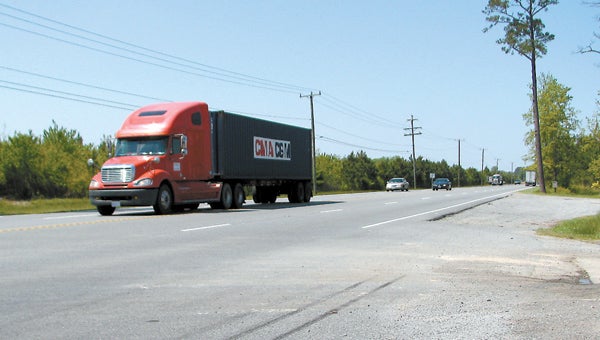One step closer
Published 9:44 pm Thursday, January 20, 2011

Route 460: A container truck rumbles down U.S. Route 460 last year. A group of proposals to build a new road moved forward this week.
Route 460 project moves forward
The project to build a new Route 460 is one step closer to reality after the Commonwealth Transportation Board voted to move the project forward.
The board voted Wednesday to advance each of the private proposals to build the road to the next phase of the process. In addition, the board approved a number of recommendations from an independent review panel that has been working on the project.
The new road is the top transportation priority of Gov. Bob McDonnell. Proponents say a better, safer Route 460 will increase freight movement — and therefore the region’s economic development — as well as improve the military’s strategic connectivity, improve travel safety along the corridor and make a safer, less flood-prone evacuation route for Hampton Roads.
Three private companies have submitted proposals under the state’s Public Private Transportation Act. The proposals will place significant tolls on vehicles traveling the road and will require public subsidies, the transportation board found.
The companies — 460 Partners, LLC, Cintra Infraestructuras, S.A., and MultiModal Solutions, LLC — each propose to build the road at a cost of between $1.49 billion and $2.72 billion.
The three companies now will be invited to submit more detailed proposals.
The new road will be a 55-mile, four-lane, divided, limited-access highway between Suffolk and Petersburg. It will be built roughly parallel to the current Route 460.
The independent review panel found that none of the three private companies will be able to build the road without a sizable public contribution. It recommended the Commonwealth Transportation Board determine the maximum amount the state will provide and include that in the request for detailed proposals.
All the proposals call for tolls on the new road, ranging from $3.85 for motorcycles to $75 for tandem trailers. Two-axle vehicle tolls range from $5.94 to $11, and would increase with time.
In return for paying money, drivers could get to go faster. One proposal suggests a speed limit of 75 miles per hour.
In addition, they said, the Virginia Department of Transportation should work closely with the companies to evaluate “innovative financial alternatives” to produce lower projects costs. The board also directed VDOT to respond to design and location concerns expressed by the public and to work to identify innovative designs for connections with existing roadways at each end of the new project.
The resolution approved by the board also calls for a “robust public involvement process” in the continuation of the project.






